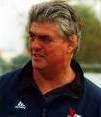
This week's interview is with Duncan Hall. Duncan Hall is a former Wallaby, played 75 times for the Queensland reds and also played for NSW a few times (he leaves that off his resume) and now specialises in athletic development. He was previously involved with the Waratahs and has coached throughout the world including in England and the United States rugby team. Duncan is a great thinker and has recently co-founded S.P.A.C.E. Total athletic development. I hope you enjoy this interview.
Q. What in your view are the most important aspects of an athletic development program for a professional organization?
A. It is important to actually acknowledge ‘Athletic Development’ as an integral aspect of the program. From my observations there are extremes in strength development and running development. The key elements of Athleticism are not understood. Q. What are the common mistakes made in athletic development programs.A. Missing the conversion from gym strength to sports power. An important end result is advancing players’ performance on the field not just in the gym.
Q. What changes have you seen from your playing days to the present in respect of athletic development?
A. If size was the sole indicator then the answer is substantial. However, today players have become less athletic and are over-coached. I remember seeing footage of Steve Rogers playing his athleticism was fantastic. Sure defence has improved. Sadly attack as become sterile.
Q. Who has inspired you and for what reason.
A. A young half back who was always a fringe player trained with me regularly for 6 months. He said that in the beginning he only turned up because of me. Then 2 months in during a game, he was in a position to take advantage of a gap, he accelerated through it. His turn of pace was something that he had aspired to now he had it. This he kept a secret until he left town when he said ‘thanks coach you have made me a better player’.
Q. What are your views on periodisation?
A. I believe that it is essential to planning. Build the base, Maintain the base, Refresh and be able to Finish. This is not a scientific analysis. I am into the ‘art’ of coaching. That means to me the observation and analysis of movement.
Q. How do you keep updating your knowledge?
A. This is difficult time wise. The best way for me is networking practitioners who enjoy sharing knowledge.
Q. What are 3 things you do differently now compared to when you first started in athletic development.
A.
1. Developed my observation skills
2. Developed a system for under resourced coaches to follow
3. Broadened the learning environment for conditioned game play
Q. What do you most enjoy about your work?
A. The practical and developmental nature. You can see people improving becoming better players and people.
Q. What direction do you think the athletic development field should take?
A. In Australia I think that over our history we have just played. Today children play less and when they play it is organized and structured. More ‘free play’ would develop better participants who would have some fun and enjoy their sport.For the professional end of Australian sport understanding that the development of movement literary skills should start from Primary school and be built upon over a number of years just like academic subjects are. Athletic development training concepts cannot be started when you are identified as having sports talent.
I enjoyed this interview very much as Duncan hits the nail on the head about freeplay. Our kids just need to get out and play a variety of activities. These activities should be unstructured and adult free. Learn more about what Duncan is about at www.duncanhallsport.com and I can tell you Rugby in this country would be in a much better place if Dunc was involved at the highest level but in the mean time many youngsters are enjoying the benefits of his wise words.

No comments:
Post a Comment